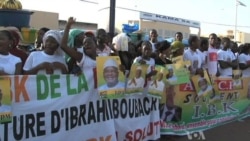BAMAKO —
Malians head to the polls Sunday for a presidential run-off election that many hope will be the turning point in an 18-month crisis that has included a military coup, a takeover of the north by armed groups and a French-led military offensive against those groups this year. Twenty seven presidential candidates were in the first round July 28, but just two are headed to the run-off. The past week has seen political alliances made and broken.
Two candidates are on the ballot: former prime minister Ibrahim Boubacar Keita, a National Assembly deputy from Bamako, and Soumaila Cisse, a technocrat from Timbuktu.
The men once belonged to the same political party. They served in government together in the 1990s, with Keita as prime minister and Cisse as finance minister.
Then their paths diverged. Cisse became a steadfast supporter of President Amadou Toumani Toure, who was ousted in a March 2012 coup and is blamed by many Malians for the ongoing crisis.
Keita became Toure's most outspoken critic, something the candidate has underscored on the campaign trail. He said, "Mali was stolen from us. That government ate it up and sucked the bones dry. They humiliated us to the point that people started to ally with the Islamists. Attention, Malians, that will never happen again."
His campaign has been about big ideals -- nationalism, honor, dignity. Opponents said he is vague on details. His supporters say they back the man, not the plan.
Supporter Ali Badra Keita said, "We have become a country in disarray, where everything is permitted so we want a tough leader, and that is IBK."
Keita dominated the first round with 39 percent of the vote. Most of the 25 candidates eliminated in that round are now backing him, including third-place candidate Dramane Dembele, whose party, ADEMA, is an ally of the rival candidate, Cisse.
But Malians said they are used to the fickle nature of their political class.
Cisse supporters like Alhousseini Sow said the race is not over. "It doesn't matter what alliances politicians are making. Like Cisse says, this is a fresh election. Voters should be left to make their choices without manipulation or pressure," he said.
Cisse raised concerns about vote-rigging and intimidation in the first round and has called on his supporters to be vigilant.
Ever the financial manager, he talks about investing in Mali's future.
Cisse told supporters gathered at his headquarters Wednesday, "Even if we win the elections, the battle will be far from over. We must then rebuild the country. We must tackle unemployment and poverty. We need to invest in this country, in agriculture, livestock farming, fishing. We need to build roads and factories. We need to create wealth so that each of you can live a happy life."
It is hard to gauge the two candidates' chances.
Friday is the only real day of campaigning ahead of the vote, following delays in confirming first-round results and a Muslim holiday Thursday.
Amadou Maiga contributed reporting from Bamako.
Two candidates are on the ballot: former prime minister Ibrahim Boubacar Keita, a National Assembly deputy from Bamako, and Soumaila Cisse, a technocrat from Timbuktu.
The men once belonged to the same political party. They served in government together in the 1990s, with Keita as prime minister and Cisse as finance minister.
Then their paths diverged. Cisse became a steadfast supporter of President Amadou Toumani Toure, who was ousted in a March 2012 coup and is blamed by many Malians for the ongoing crisis.
Keita became Toure's most outspoken critic, something the candidate has underscored on the campaign trail. He said, "Mali was stolen from us. That government ate it up and sucked the bones dry. They humiliated us to the point that people started to ally with the Islamists. Attention, Malians, that will never happen again."
His campaign has been about big ideals -- nationalism, honor, dignity. Opponents said he is vague on details. His supporters say they back the man, not the plan.
Supporter Ali Badra Keita said, "We have become a country in disarray, where everything is permitted so we want a tough leader, and that is IBK."
Keita dominated the first round with 39 percent of the vote. Most of the 25 candidates eliminated in that round are now backing him, including third-place candidate Dramane Dembele, whose party, ADEMA, is an ally of the rival candidate, Cisse.
But Malians said they are used to the fickle nature of their political class.
Cisse supporters like Alhousseini Sow said the race is not over. "It doesn't matter what alliances politicians are making. Like Cisse says, this is a fresh election. Voters should be left to make their choices without manipulation or pressure," he said.
Cisse raised concerns about vote-rigging and intimidation in the first round and has called on his supporters to be vigilant.
Ever the financial manager, he talks about investing in Mali's future.
Cisse told supporters gathered at his headquarters Wednesday, "Even if we win the elections, the battle will be far from over. We must then rebuild the country. We must tackle unemployment and poverty. We need to invest in this country, in agriculture, livestock farming, fishing. We need to build roads and factories. We need to create wealth so that each of you can live a happy life."
It is hard to gauge the two candidates' chances.
Friday is the only real day of campaigning ahead of the vote, following delays in confirming first-round results and a Muslim holiday Thursday.
Amadou Maiga contributed reporting from Bamako.





